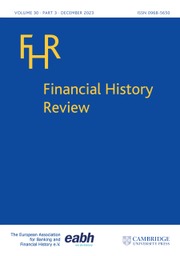Article contents
The Austrian banking crisis of 1931: a reassessment
Published online by Cambridge University Press: 10 January 2019
Abstract
The current literature on the causes of the Austrian financial crisis in 1931 emphasises both foreign and domestic factors. This article offers new data to analyse this issue. Its findings reinforce the importance of a domestic factor in bringing about the crisis: universal banks’ exposure to industrial enterprises, which were the universal banks’ main borrowers and creditors. During the 1920s, these industrial enterprises failed to perform well, rendering the universal banks insolvent. The Credit-Anstalt, which became an ‘acquirer of last resort’ for three other universal banks during the 1920s, was insolvent as early as 1925. The bank, however, could have avoided bankruptcy had it been spared the burden of Unionbank's non-performing assets.
JEL classification
Information
- Type
- Articles
- Information
- Copyright
- Copyright © European Association for Banking and Financial History e.V. 2019
Footnotes
I am grateful for the help of my referees at the Financial History Review Fast-Track New Scholar Workshop in Turin, Nathan Marcus and Christopher L. Colvin, who provided very useful comments. I discussed some early thoughts on this article with Professor Peter Eigner. My two PhD supervisors at the London School of Economics, Professor Max-Stephan Schulze and Dr Tamás Vonyó, both provided important feedback to improve earlier versions of this article. Comments from participants in seminars at the London School of Economics, the Banque de France, Nuffield College, Oxford, and the Annual Conference of the Economic History Society proved very helpful. Claudia Köpf and Walter Antonowitz kindly supported my work at the Archive of the Austrian National Bank. Funding from the Economic and Social Research Council is gratefully acknowledged.
References
Sources
References
- 4
- Cited by


